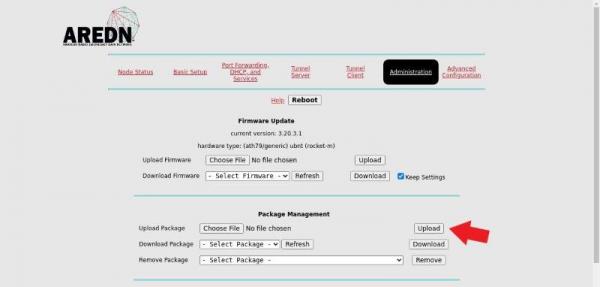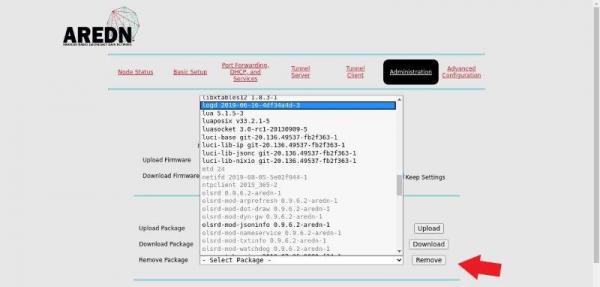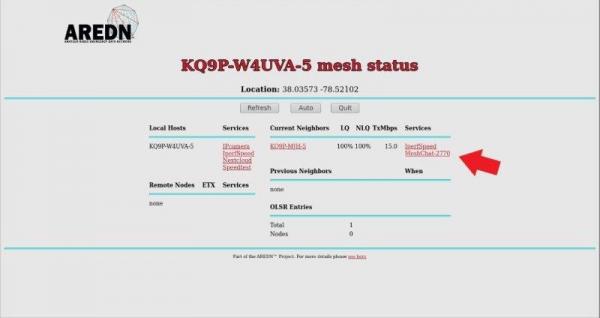I installed MeshChat on two nodes about six months ago, tinkered with it for a while, and deleted it. The advertised services won't go away on one node, though. It continues to advertise MeshChat even though it isn't actually there. Any thoughts about how to kill this zombie? (The node is a Rocket M5 running the latest firmware.)
Thanks. Mike
Thanks. Mike


Turn off OLSRD on the node that had the service deleted for 5 minutes:
;OLSRD stop, take-a-nap, then reboot.
SSH into the node and enter:
/etc/init.d/olsrd stop; sleep 4m; reboot
I hope this helps,
Chuck
I will try the OLSRD nap idea, but first a question. The problem node is in a location very difficult to access, so I manage it over-the-air. Will stopping OLSRD cause me to lose connectivity with the node?
Thanks. Mike KQ9P
Yes.
That is why my suggested command sequence ended with a reboot.
A kind of 'failsafe' way of ensuring the node returns.
Your problem description 'sounds like' the common event where someone modifies a node setting and then all the other nodes show a double entry;
'the old name'/'the new name' or the 'old service name' over the 'new service name'.
There are 2 solutions to this scenario:
1. Reboot all the other nodes in the network or
2. Turn off OLSRD on the changed node for about 5 minutes.
The network forgets about the changed node and accepts the fresh service broadcast when it returns.
Simply rebooting the changed node does not keep its OLSR 'off the air' long enough for all the other nodes in the network to 'forget'.
Actually, the multiple command line could be:
/etc/init.d/olsrd stop; sleep 5m; /etc/init.d/olsrd start
The 'reboot' adds about another 1 minutes to the 'sleep time'. :-|
If this is not a solution to you problem, I will likely delete my replies.
Please be careful if you reply to one of my notes as you continue your search for a solution.
3s, Chuck
If you have wired access to the node, try unchecking 'Keep Settings' then upload.
"I installed MeshChat on two nodes about six months ago, tinkered with it for a while, and deleted it."
'it'
Was 'it' deleting the .ipk via /admin - Package Management - Remove Package or
Was 'it' deleting the DHCP Address Reservation via /ports - Save Changes - Reboot or
both ?
Chuck
Hi Chuck





Sorry about the delay, fighting other fires.
The whole sequence of actions. I installed MeshChat (meshchat_1.02_all.ipk) on two nodes using the package "Upload" function, then rebooted:
MeshChat appeared as an advertised service on both nodes. After some experimentation, we concluded running MeshChat on a server would be a better approach. I removed MeshChat from both nodes using the package "Remove" function:
As you can see, the package is no longer installed.
I deleted the advertised service using the "Del" function (this screenshot is from a different node, since I didn't do screenshots at the time):
Then I rebooted. The setup screen shows the advertised service no longer exists:
The advertised service on the mesh status display disappeared for one of the nodes, but remained for the other:
This zombie service advertisement has persisted through AREDN version upgrades, reboots, and the OLSR cycle you suggested. I also tried reinstalling and removing MeshChat to see if it would clear the advertisement correctly this time; it did not.
I hope that makes things clear. Again, thanks very much for your help in trying to figure out this glitch.
73, Mike KQ9P
I deleted the advertised service using the "Del" function (this screenshot is from a different node, since I didn't do screenshots at the time):
Maybe insert here: 'Save Changes'.
Then I rebooted. The setup screen shows the advertised service no longer exists:
If only the time delay of a reboot...
The former 'advertised service' ghost will still be shown on [all] the other nodes in your network.
This is where stopping OLSRD on the node with a former 'advertised service' for a few minutes will allow the ghosts to go away.
After a few minutes the network will 'forget' about the edited node.
Then, when the node's OLSR broadcasts reappear on the network, the new 'advertised services', if any or none, will be updated.
I think. :-|
These ghosts also happen when a node name or alias is changed.
"#OLSRD stop, take-a-nap, then reboot:
/etc/init.d/olsrd stop; sleep 4m; reboot"
Else, to remove this/these ghosts on all the other nodes, all the other nodes must be rebooted.
This is akin to when renting a VHS tape, 'Please be kind and rewind'.
When changing advertised services or node names or node aliases, please be kind and
stop the edited node's OLSR broadcasts for => 5 minutes.
I hope this helps, Chuck
We haven't found a solution to the problem, but you can take it off your list. If I am able to get access to the problem node I'll just do an initial load and wipe the configuration.
Thanks. Mike KQ9P